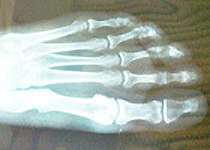
Psoriasis is an immune-mediated condition that can lead to the appearance of inflamed, scaly patches of skin. People with this skin condition are at risk for developing a related condition called psoriatic arthritis (PsA), which is an inflammatory form of arthritis that also involves the insertion of tendons and ligaments into bone (enthesitis), swelling of a whole digit (dactylitis) and inflammatory spinal disease. Early diagnosis and treatment of PsA is essential because, if left untreated, it can lead to disability and permanent joint damage.
While the underlying cause of PsA is unclear, genetics are known to play a role. Recently, TWRI Senior Scientist Dr. Dafna Gladman led a study to reveal which genes are involved in PsA development. Her research team compared the levels of thousands of genes present in blood samples from people with psoriasis alone with those from people with PsA. The results showed that similar genes seem to be involved in both psoriasis and PsA and that five of these genes may serve as robust readouts (biomarkers) that could be used to predict which patients develop PsA.
In addition, specific genes that Dr. Gladman found to be associated with PsA also shed light on the involvement of various molecular pathways. Dr. Gladman comments, "While the identified biomarkers provide a way to detect the earliest stages of disease, our results also provide insight into the underlying immunological and molecular factors that contribute to development of the disease."
This work was supported by the Krembil Foundation, the Canadian Institutes of Health Research and the Toronto General & Western Hospital Foundation.
Gene expression differences between psoriasis patients with and without inflammatory arthritis. Pollock RA, Abji F, Liang K, Chandran V, Pellett FJ, Virtanen C, Gladman DD. Journal Investigative Dermatology. 2014 September 22.[Pubmed abstract]





Comments